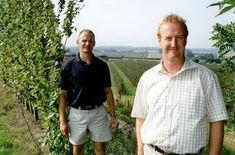
The outstanding image on the coat of arms that makes up part of Adrian Scripps company logo is an elephant.
It is particularly appropriate in the sense that the directors and staff have never forgotten that, having achieved the reputation of being one of the industry’s leading apple and pear growers, they are still in a competitive business.
“It has reached a point where only the best is good enough for us, to not just survive, but to continue to expand,” says chairman Richard Scripps. His father Adrian, who began farming in the traditional Weald of Kent in 1960, retired in 1997, but still retains a place on the board as non-executive director.
The company philosophy, however, remains the same and always began with the right choice of land and the crucial selection of varieties, followed by new growing and pruning techniques.
What is perhaps the most remarkable aspect is, while the English top-fruit industry has continued to contract with many families leaving the business, Adrian Scripps has thrived. In its time it has been a member of a co-operative and then linked to an independent marketing organisation, before deciding to return to its independence.
“All our investment has come out of earned profits,” reveals managing director James Simpson. “Fruit growing will always be a long term business, and it is vital to think ahead.”
Today it has five farms throughout Kent, chosen to meet specific climatic and soil requirements as well as spread the risk of weather damage. It grows a total of 400 hectares (1,000 acres) of top fruit in the county.
The lynchpin is Moat Farm at Five Oak Green, which houses administration and provides centralised storage and packing facilities.
This consists of 53 ultra-low oxygen chambers with a capacity of 10,000 tonnes, approximately 75 per cent of total production, backed by grading lines that use computerised colour and blemish sorting and a range of pre-packing machinery, which provide a flexible response to retail orders.
For many years, Adrian Scripps has continued to remain true to many English varieties whose names have a similar value to some top brands. As a result it is both a major producer of Bramley, and based on Conference, Comice and Concorde, it is probably the largest independent pear grower in Europe.
“But today we are also always looking for potential winners which have similar unique properties and new tastes,” says Simpson.
Its dessert apple orchards in fact represent a microcosm of how the industry has changed over even the last decade.
Cox is still highly valued, but in Scripps production terms was overtaken by both Royal Gala and Braeburn during the mid 1990s.
Most recently, what caused a stir on the Tesco stand at the National Fruit Show at Detling last autumn was the appearance of Greenstar - a Delcorf/Granny Smith hybrid for which Adrian Scripps has exclusive rights.
Once again it was prepared to make a major investment. Some 18,000 trees went in the ground in 2002, and next season orchards will reach commercial maturity and eventually produce over 100,000 cartons of fruit by 2010.
“Greenstar has grown well in the UK, and we have been impressed with its consistent size and shape,” says Mark Holden, production director. “While we do not regard it as an alternative to Granny Smith, it is the first solid-coloured green apple that the UK has successfully produced.
“But because it stores well and has a long shelf life, it does give customers continuity between February and June, between the northern and southern Granny seasons.”
There is also another potential winner in the pipeline - Kanzi - a highly-coloured Braeburn/Gala cross, which originated from the well-known Belgian breeder Johan Nicolai, and Holden says has similarities to Jazz.
The first fruit is beginning to come through and looks particularly promising with a similar volume to Greenstar expected in five years.
As Adrian Scripps continues to reshape its orchards, with Cox and Gala proportionately reducing, the total volume of top fruit will still rise and soon reach an average of over one million cartons each year.
Growing, storing and packing the right varieties to a high standard is not the end of the story.
“Being in touch with our retail customer on an almost daily basis has meant marketing has become a key component,” says Simpson. “This extends far beyond full traceability from the store. Fruit quality is constantly monitored throughout the season so we can respond to any situation immediately.”
“We don’t just compete with other apples and pears,” adds Scripps. “There are times when we face the impact of cheap citrus, bananas, and much more. If we are going to protect our future and maintain retail loyalty we must always ensure we can deliver a quality product, which, being British, will make a premium.”